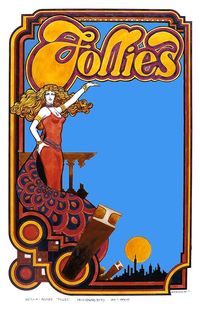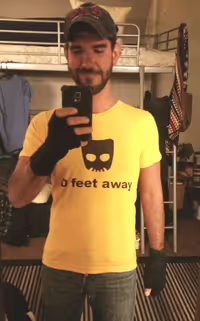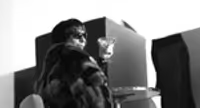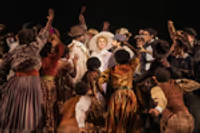FOLLIES - The Intermission is Back
#100FOLLIES - The Intermission is Back
Posted: 9/2/11 at 11:07amThey're not acting like zanies at the theatre. They're acting like zanies in a chat room. That's different. And, I think, allowable.
bk
Broadway Legend Joined: 7/20/03
#101FOLLIES - The Intermission is Back
Posted: 9/2/11 at 11:40amApparently you haven't been to the theatre lately. When I attended Follies and Catch Me If You Can a few weeks ago, both audiences were filled with screaming, whooping "zanies" - it was so irritating. You cannot not know what I'm talking about or perhaps you enjoy being obtuse and convoluting someone's words, which I think are more than clear. I'm talking about loud, unnecessary, disruptive AUDIENCE behavior at musicals, where everyone is intent on making sure they're screaming and cheering louder than the next person. One idiot at Follies tried to lead a standing ovation after Who's That Woman - ONE guy stood up - what a jerk. And I must say, he was a middle-aged man who should know better.
#102FOLLIES - The Intermission is Back
Posted: 9/2/11 at 11:46am
One friend recently asked why "Loveland" looked like it was taking place in Satan's intestines. Another friend remarked that it was the show's Spooky Mormon Hell Dream.
Only in New York, kids, only in New York.
Martha: (to George) "Abstruce. In the sense of recondite. Don't tell me words."
#103FOLLIES - The Intermission is Back
Posted: 9/2/11 at 12:28pm
wow. why does everyone always at each other's throats on this board? tranquilos.
on topic: has the intermission been back all week? the last comment was from tuesday. thanks.
FindingNamo
Broadway Legend Joined: 7/22/03
#104FOLLIES - The Intermission is Back
Posted: 9/2/11 at 1:13pm
"You cannot not know what I'm talking about ..."
Bruce, how can you not know that not everybody experiences and reacts to things in the exact same way you do?
#105FOLLIES - The Intermission is Back
Posted: 9/2/11 at 1:51pm
"Buddy walks in on them."
So THATS what Schaeffer meant, AC126748...Buddy never walked in during the DC production, it just ended with the beautiful last note of Too Many Mornings. thank you. Can't wait to see this.
Updated On: 9/2/11 at 01:51 PM
#106FOLLIES - The Intermission is Back
Posted: 9/2/11 at 2:02pmI seem to recall that in Washington, Buddy did come onstage to see Ben and Sally embracing at the end of "Too Many Mornings", at least the night I saw it.
Ed_Mottershead
Broadway Legend Joined: 10/20/05
#107FOLLIES - The Intermission is Back
Posted: 9/2/11 at 2:08pmI was at last Friday's performance -- the intermission was back and Buddy did see Ben canoodling with Sally. With or without an intermission, Follies is a fairly long show, but I can't think of any place else that would make for an appropriate break. Just after I'm Still Here? It's a lose-lose situation. And warts and all, it's still a masterpiece.
#108FOLLIES - The Intermission is Back
Posted: 9/2/11 at 2:11pm
Abstruse.
bwayfan7000
Broadway Legend Joined: 3/28/09
#109FOLLIES - The Intermission is Back
Posted: 9/2/11 at 2:20pmBuddy definitely walked in at the end of Act 1 (both young and adult Buddy) when I saw it in DC, and I was under the impression that it was like that the entire run. Could be mistaken, though.
Phyllis Rogers Stone
Broadway Legend Joined: 9/16/07
#110FOLLIES - The Intermission is Back
Posted: 9/2/11 at 2:25pmI thought I remembered it that way from DC as well. It's certainly scripted that way.
#111FOLLIES - The Intermission is Back
Posted: 9/2/11 at 4:13pm
Buddy (and Young Buddy) definitely walked in on Ben and Sally in DC. I made sure to check, as it's one of my favorite moments in the show. It's definitely in the stage directions of at least one of the scripts.
The only thing that might be slightly different for Broadway is: on the final chord, the lights go down, and only Buddy is lit in a spotlight. I don't remember that in DC, and it really looks great.
The scene leading into the song has been restaged; it now takes place on stage left. Also, Ron and Bernadette are more passionate than ever now, they do more kissing during the brief pause before the final verse. And I still love how Ron passionately kisses Bernadette after she says "If you don't kiss me, I think I'm gonna die." I've never seen that in any other production.
Updated On: 9/2/11 at 04:13 PM
#112FOLLIES - The Intermission is Back
Posted: 9/2/11 at 4:51pm
OK - sorry, I guess I must have missed that part about Ben coming on and interrupting at the end of act 1 in DC, as my attention was so stuck on Raines and Peters at that moment.
the spotlight must be the new part. That must look great.
#113FOLLIES - The Intermission is Back
Posted: 9/2/11 at 5:00pmWhere do old people go to the bathroom? Depends.
#114FOLLIES - The Intermission is Back
Posted: 9/2/11 at 5:55pmJust finished watching a video from DC and Buddy 100% walks onstage from the upstage door at the end of Too Many Mornings.
#115FOLLIES - The Intermission is Back
Posted: 9/2/11 at 5:58pm^ Yup! It's like that on my video too. If Buddy did not walk on and see Sally and Ben, the Act 1 finale would not have the "punch" it needs.
bk
Broadway Legend Joined: 7/20/03
#116FOLLIES - The Intermission is Back
Posted: 9/3/11 at 1:46am
"Bruce, how can you not know that not everybody experiences and reacts to things in the exact same way you do?"
Because on this very board many people have posted the exact same thoughts, and if one is being clear in what they are saying and another is purposely convoluting the words and points, then it has nothing to do with reacting the same way I do. Thanks for posting, though - it's always enjoyable.
#117FOLLIES - The Intermission is Back
Posted: 9/3/11 at 6:55am
^ Yup! It's like that on my video too. If Buddy did not walk on and see Sally and Ben, the Act 1 finale would not have the "punch" it needs.
Trouble is, bringing Buddy on to see them for a first-act curtain is hokey. It's old-fashioned, melodrama: "Oh, no! My husband!" "Aha! She IS untrue!"
It turns Follies into soap-opera.
It makes whatever grand-ness the musical had in the first act prior to that seem petty and brings the whole enterprise down to a low level of quality from which it can never bounce back.
The intermission makes Follies MORE like what its detractors feel about it, not less.
Heartbreaking.
Videos









